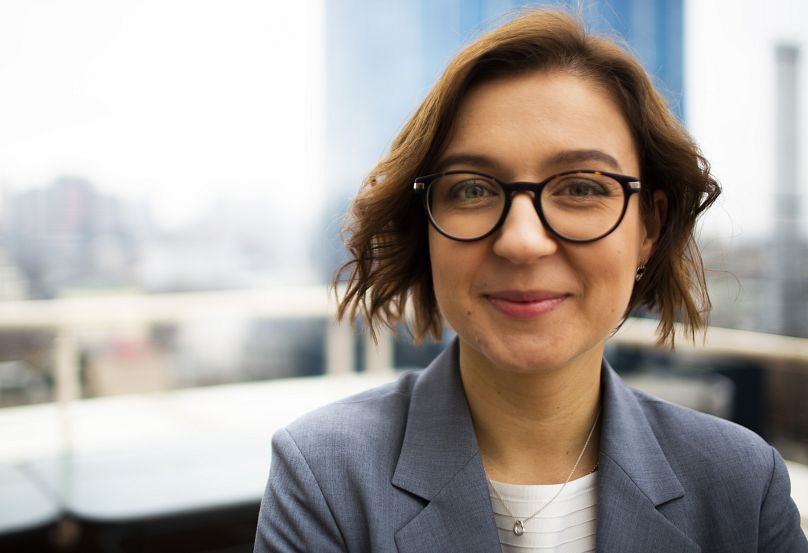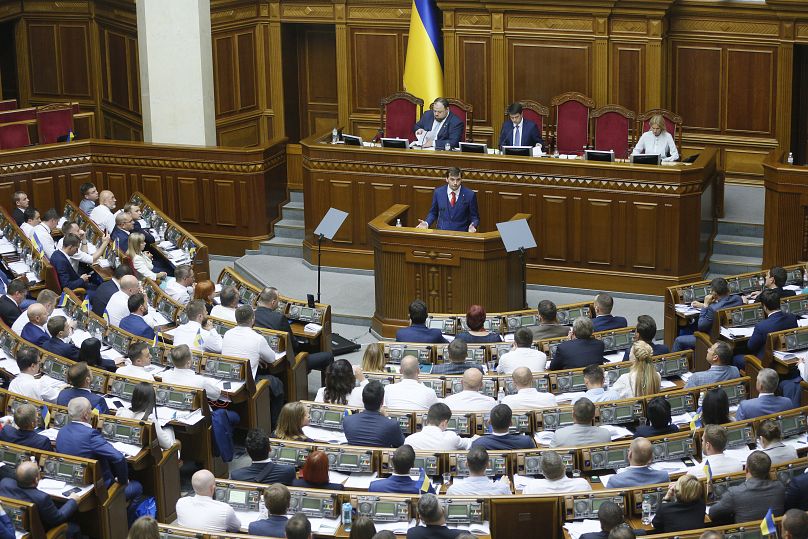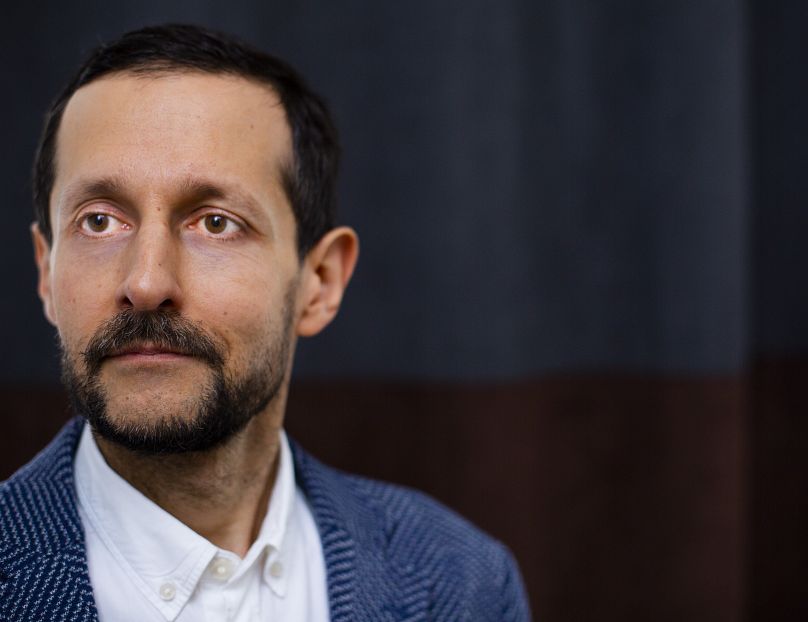The Ukrainian opposition is concerned about new reforms in the country. They fear the president and his party are centralising power, which could be dangerous in the long run. Experts also criticise some steps by the government but say previous governments acted similarly.
Ukrainian President Volodymyr Zelensky promised widescale reforms during his election campaign last year, which aimed to battle widespread corruption, increase transparency, reduce oligarchic influence, and improve the economy in Ukraine overall.
 ADVERTISEMENT
ADVERTISEMENT
 ADVERTISEMENT
ADVERTISEMENT
But almost a year after his landslide victories in the presidential and parliamentary elections, voices in the opposition have raised concerns about some of these proposals.
Some members of the opposition worry that proposed reforms in the justice system, media law and changes of the National Guard could centralise power around the president and his party - Servants of the People.
“Ukraine is at the state where many things are changing,” said Inna Sovsun, a member of the Ukrainian opposition party Holos (Voice).
“We believe that the government is doing some good, but to do some good, they need to get rid of rules giving opportunities for others to do bad things.”
“Centralisation of power is one issue,” said Sovsun. “Zelensky promised to be different. He said that the old elite did everything wrong, but why do you then do the same things when you are in power?”
Sovsun then pointed out that Ukraine is facing an unprecedented situation where the president's party holds the majority in parliament and, therefore, can introduce and pass laws without compromise.
She fears not only what the president and his party might do now, but also whether politicians in the future will take advantage of their proposed reforms.
“In Ukraine, we need to be careful, because we don’t know who the next president will be,” said Sovsun. “Yes, we have problems with Zelensky, but it is also a concern about the future.”
A legal reform and media law
Sovsun refers to how Zelensky - a former comedian with no political experience - was a symbol of hope for many Ukrainians when he won the presidential election and promised to clean up the country.
He ran much of his campaign on opposing the political establishment and former president Petro Poroshenko - who had low public support.
READ MORE:
- After jet tragedy and impeachment, Ukranians fatigued by bad news
- Volodymyr Zelensky holds record-breaking 14-hour press conference
- Breakthrough in Ukraine-Russia peace talks as Kyiv agrees to Donbas elections
Ukrainians have experienced a myriad of difficulties in recent years, including a declining economy with high corruption, and an armed conflict in the eastern part of the country since 2014 after the ousting of former president Viktor Yanukovych during the Maidan Revolution.
Zelensky had promised to fix these issues - and to do it fast.
During his inauguration address in May last year, he said: “My election proves that our citizens are tired of the experienced, pompous system politicians who over the [past] 28 years, have created a country of opportunities.
"The opportunities to bribe, steal and pluck the resources. We will build the country of other opportunities. The one where all are equal before the law and where all the rules are honest and transparent, the same for everyone.”
One of his many proposed reforms lies within the justice system and aims to remove judges in the Supreme Court who are found corrupt or unethical.
Sixty-two percent of Ukrainians, according to a 2019 study by the Democratic Initiatives Fund, distrust the Supreme Court, which resulted in Zelensky's proposal proving popular when he signed the bill in October.
While Sovsun and the Holos party generally welcome judicial reform, they and others fear Zelensky's bill - which seems to have been stranded in implementation - could take things too far.
The Venice Commission, an advisory body of the Council of Europe, has also praised the reform but expressed concern that certain parts of it raise “important issues of the rule of law” in Ukraine.
The Commission criticised how politicians would be seen to get too much power should they be able to remove judges.
“It is obviously dangerous for judicial independence to give the impression to the judges and to the general public that following elections it is up to the discretion of the newly elected political organs of the state whether the sitting judges remain in their position or not,” the Venice Commission said in a December report.
'It's a mixed bag'
Experts told Euronews that Zelensky's judiciary reform does in fact include proper steps toward a less corrupt system - such as the inclusion of foreign experts - but that it is still a mixed bag.
“All presidents have always tried to get some influence over the judiciary. So Zelensky is just following in the same footsteps,” said Pavlo Kutuev, the chair of the sociology department at Igor Sikorsky Kyiv Polytechnic Institute in Kyiv.
He added: “The difference here compared to before is that the president and his party have a full majority in parliament and, therefore, can introduce new laws fairly unchallenged.”
He stressed that Ukraine, compared to other countries in Europe, still has weak institutions and is, therefore, more vulnerable.
“The problem is that your intentions can be good enough, but when you try to reform something broken such as the judiciary, you might get tempted to exercise influence as well."Kutuev said, pointing out that the president's majority in parliament gives him extra responsibility to be transparent.
He then underlined that there is not any fear Zelensky would turn authoritarian, but that history had taught Ukrainians it is vital to always be critical.
Euronews reached out to both Servants of the People and the presidential administration for comment.
The party never responded, while Yulia Mendel, the press officer for the presidential administration, said on WhatsApp that Zelensky would not comment.
The friends of the President
Kutuev points out the president has taken affirmative steps to fight corruption, and that it would be wrong to consider everything terrible.
However, actions such as the judiciary reform and the new media law are worrying signs, he says.
Kutuev calls the media law, which is aimed at battling disinformation, “unacceptable, because it will measure credibility among journalists,” raising the question: “who decides which journalists and media are credible and who are not?”
The law proposed by the Ministry of Culture, Youth and Sports in Ukraine aims to battle what it calls disinformation by imposing fines, corrective labour, and imprisonment.
Aleksey Jakubin, associate professor at Kyiv Polytechnic Institute, agrees with Kutuev. He, however, emphasises that the president and his party may end up bringing long-awaited changes to the country, but that it is too early to call.
“Zelensky is similar to previous presidents in some regards,” said Jakubin. “For example, he appoints people that he knows to important positions, such as his school friend as head of the Ukrainian security services and his business partner Andriy Yermak as his special advisor, who is acting almost as the minister of foreign affairs.
"It is like previous presidents, and it is important to keep track of in a country, where power often lies in your connections and not based on the law.”
He added: “The tricky part is that you cannot transform the system without getting some influence.
“In a country like Ukraine, gaining influence is always a concern, especially when you are a president with a majority in parliament. We will have to see whether these concerns are justified.”
READ MORE:
- TV comedian sworn in as President of Ukraine
- How is Russia reacting to Zelensky's election win in Ukraine?
- Outsiders, reforms, oligarchs: What you need to know about Ukraine's parliamentary election
On the right track
The worries about such reforms can easily give a one-sided view of the Ukrainian government, explains Taras Shevchenko, the director and founder of the Centre for Democracy and Rule of Law, in Cedem, in Ukraine.
The think-tank has been supporting independent media, civic platforms, and the creation of a legal state in Ukraine since 2005 of which Shevchenko is often used as advisor.
Shevchenko pointed out that the Ukrainian president and his party had taken steps towards a better economy and other reforms battling corruption.
While he shares some concerns about the judiciary reform and the media law, he stays positive about the future. He also expressed hope that the proposed media law and judiciary reform will be amended.
“At this point, I am rather positive and optimistic about the developments in Ukraine,” said Shevchenko.
“I see some positive reforms and some risks as well. We need to mitigate all these risks and we need to fight initiatives such as the draft law on disinformation, which is considered negative by most journalists, civil society and international observers.”















